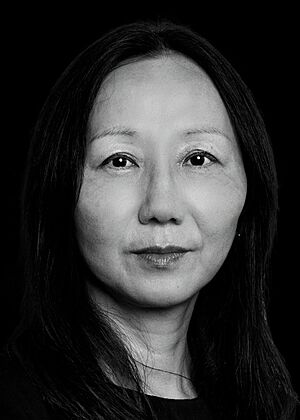Zhenan Bao facts for kids
Quick facts for kids
Zhenan Bao
|
|
|---|---|
| 鲍哲南 | |

Bao in 2024
|
|
| Born | 1970 (age 55–56) |
| Citizenship | United States |
| Alma mater | |
| Known for | Organic semiconductors, electronic skin |
| Scientific career | |
| Fields | Polymer science |
| Institutions | |
| Thesis | Exploration of palladium-catalyzed reactions for the syntheses of functional conjugated polymers (1995) |
| Doctoral advisor | Luping Yu |
| Notable students | Helen Tran Xiaodan Gu Jia Liu |
Zhenan Bao (Chinese: 鲍哲南; pinyin: Bào Zhé-nán; born in 1970) is a brilliant chemical engineer. She was born in China and is now an American citizen. She is a top professor at Stanford University. Her work focuses on creating amazing new materials. These materials can be used in things like flexible electronics and even electronic skin.
Contents
Early Life and Education
Zhenan Bao was born in Nanjing, China, in 1970. Her mother was also a professor who studied physical chemistry at Nanjing University.
Bao started studying chemistry at Nanjing University in 1987. She worked in a lab there, learning about how to create special materials called polymers.
In 1990, Bao and her family moved to the United States. She first attended the University of Illinois at Chicago. A few months later, she was accepted directly into a PhD program at the University of Chicago. This was very impressive because she hadn't even finished her bachelor's degree yet! She earned this spot because of two awards she won in China.
At the University of Chicago, Bao worked with Professor Luping Yu. She studied how to make polymers that could conduct electricity or act like liquid crystals. She earned her Master of Science degree in chemistry in 1993. Then, she received her Doctor of Philosophy (PhD) in chemistry in 1995.
Amazing Discoveries and Career
After finishing her PhD, Bao decided to join Bell Labs at Lucent Technologies. This was a famous research lab. There, she created the very first all-plastic transistor. A transistor is like a tiny switch that controls electricity. Her invention, called an organic field-effect transistor, helped make things like electronic paper possible.
During her time at Bell Labs, another scientist published some papers that claimed big breakthroughs. Zhenan Bao was listed as a co-author on two of these papers. Later, it was found that the other scientist had made up some of his results. However, Zhenan Bao was completely cleared of any wrongdoing. She was recognized as a top technical staff member at Bell Labs in 2001. She also helped start the Stanford Wearable Electronics Initiative (eWEAR). This group works on electronics you can wear.
In 2004, Bao became a professor at Stanford University. Her research there focuses on organic semiconductors and carbon nanotubes. These are tiny materials that can conduct electricity. She and her team are working on exciting projects like developing electronic skin and solar cells made entirely from carbon.
Bao is also involved with new companies. She helped start C3 Nano and PyrAmes Health. These companies are working on new technologies.
Current Research Projects
Zhenan Bao and her team at Stanford University are always working on new ideas. As of 2022, they have several cool projects.
Skin-like Electronics
One project involves creating skin-like electronic circuits. They use a special printing method to make these flexible materials. These new materials could be used for sensors on your skin. They might also help create networks that cover your whole body. Even tiny electronics that can be placed inside the body are possible. The process they use is called photolithography. It helps them make these flexible materials.
Smart Polymers for Cells
Bao has also worked with another scientist, Karl Deisseroth. Together, they developed special polymers that can interact with living cells. These polymers can change how certain cells, like brain cells (neurons), behave. They can either slow down or speed up the signals in neurons. This technology is a powerful tool. It helps scientists understand diseases like multiple sclerosis much better.
Awards and Recognitions
Zhenan Bao has received many important awards and honors for her work. Here are some of them:
- 2000: Named one of the Top 100 Young Engineers in the U.S.
- 2001: Won an R&D 100 Award for her work on plastic circuits for electronic paper.
- 2003: Recognized as one of the Top 100 young innovators of the century by MIT Technology Review.
- 2009: Awarded the Beilby Medal and Prize for her discoveries in organic semiconductors.
- 2013: Named one of MIT Technology Review's TR35 (top young innovators).
- 2015: Listed among Nature's 10 "people who mattered" in science. This was for her work on wearable electronics, including artificial skin that can feel touch.
- 2016: Elected to the U.S. National Academy of Engineering. This is a very high honor for engineers.
- 2017: Received the L'Oréal-UNESCO Awards for Women in Science. This award recognized her work on new polymers for electronics, energy, and medicine.
- 2020: Awarded the Willard Gibbs Award.
- 2021: Elected to the American Academy of Arts and Sciences.
- 2022: Awarded the VinFuture Prize in the Female Innovator category. This was for her amazing work on electronic skins.
- 2023: Received the Samsung Research Award.
- 2024: Became a member of the National Academy of Science.
Personal Life
Zhenan Bao is married and has two children. One of her important mentors was Elsa Reichmanis, who was a director at Bell Labs.
See also
 In Spanish: Zhenan Bao para niños
In Spanish: Zhenan Bao para niños
 | Selma Burke |
 | Pauline Powell Burns |
 | Frederick J. Brown |
 | Robert Blackburn |

